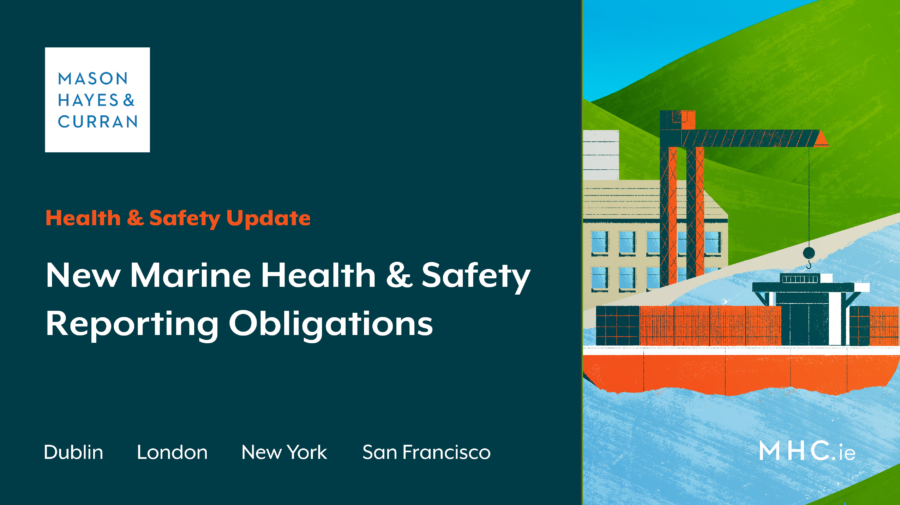New Marine Health & Safety Reporting Obligations

New regulations have recently come into effect which update and consolidate the health and safety reporting obligations for Irish ships. Owners of Irish ships should familiarise themselves with the new regulations, which include criminal penalties for non-compliance. Our Health & Safety team provides an overview of what the obligations entail.
New health and safety regulations for Irish ships have recently come into effect. The new regulations replace three sets of regulations from 1988 and provide an updated, consolidated version of the law. The new regulations update the powers and duties of ship owners, safety officers, safety representatives and safety committees.
Application
The new regulations, titled the Merchant Shipping (Health and Safety General Duties and Reporting of Marine Incidents) Regulations 2023, apply to all Irish ships save for non-sea going ships, fishing vessels, pleasure craft and ships of war. An ‘Irish ship’ means state-owned ships, ships owned by Irish citizens or Irish companies which are not registered in a foreign jurisdiction, and other Irish-registered ships.
Obligations on ship owners
Ship owners must appoint a safety officer to take responsibility for improving onboard safety and develop and promote measures for the prevention of marine incidents. If a ship has a crew of five or more, the safety officer may elect a safety representative from each department of the ship. Once elected, the ship owner must form a safety committee. There are additional reporting duties for safety committees.
It is an offence for a ship owner not to appoint a safety officer or to form a committee where required. It is also an offence for a ship owner not to record the appointment of a safety officer, safety representative or safety committee in a ship’s logbook.
Duties of safety officers
The statutory duties of safety officers include, among other things, using best endeavours to:
- Ensure the International Labour Office’s standard “Accident prevention on board ship at sea and in port” (the Code) is complied with
- Ensure the ship owner’s health and safety policies are complied with
- Promote a culture of safety and improve safety awareness among crew
- Carry out risk assessments to identify potential hazards to the crew, ship and to the environment
- Investigate every ‘marine incident’ and all complaints from crew regarding health and safety
- Stop any work which poses a risk to health and safety, and
- Maintain health and safety records
Powers of safety representatives
Safety representatives may participate in health and safety investigations carried out by a safety officer. They are also entitled to investigate a ‘marine incident independently’ or complaints from crew regarding health and safety matters, provided they do so on notice to the ship master.
A safety representative is also entitled to inspect records maintained by a safety officer and to make representations concerning health and safety matters on behalf of the crew to the ship master.
Duties of safety committees
The duties of safety committees are similar to the duties of safety officers but at a higher level and without any duty to investigate marine incidents, complaints, or other occurrences. The purpose of committees is to ensure that the Code and health and safety policies are complied with and that appropriate health and safety training and campaigns are implemented.
Reporting obligations
Under the new regulations, all ‘marine incidents’ must be reported by the ship owner to the Marine Survey Office of the Department of Transport as soon as possible after the incident occurs. The ship owner must maintain a record of all ‘marine incidents’.
It is an offence for a ship owner to fail to comply with these reporting obligations.
Conclusion
The new regulations provide a welcome, concise restatement of the law. Owing to the inherent danger in marine activities and the potential for offences to be committed unwittingly under the new regulations, it is important that ship owners are familiar with their obligations.
For more information, please get in touch with a member of our Health & Safety team.
The content of this article is provided for information purposes only and does not constitute legal or other advice.
Share this:





